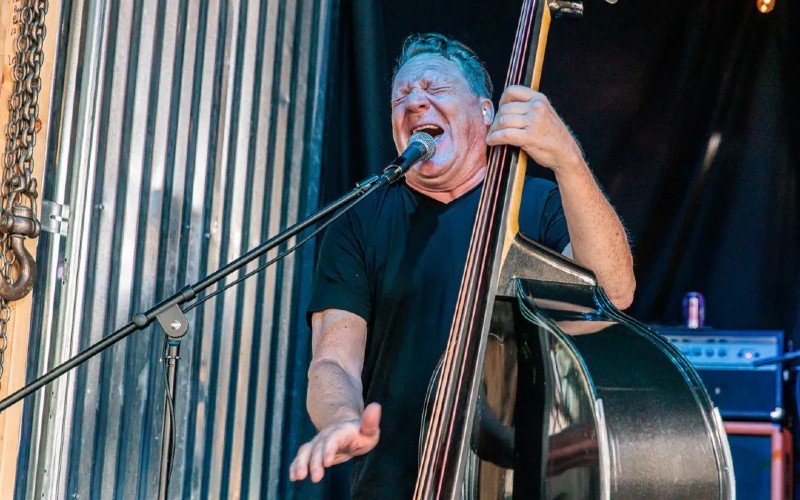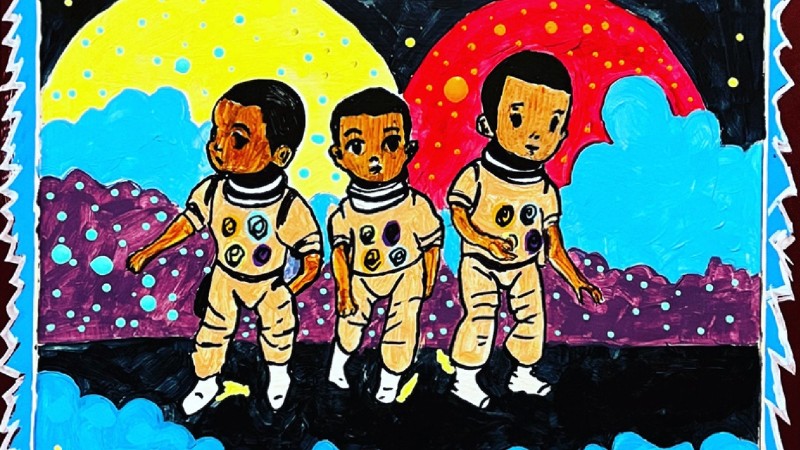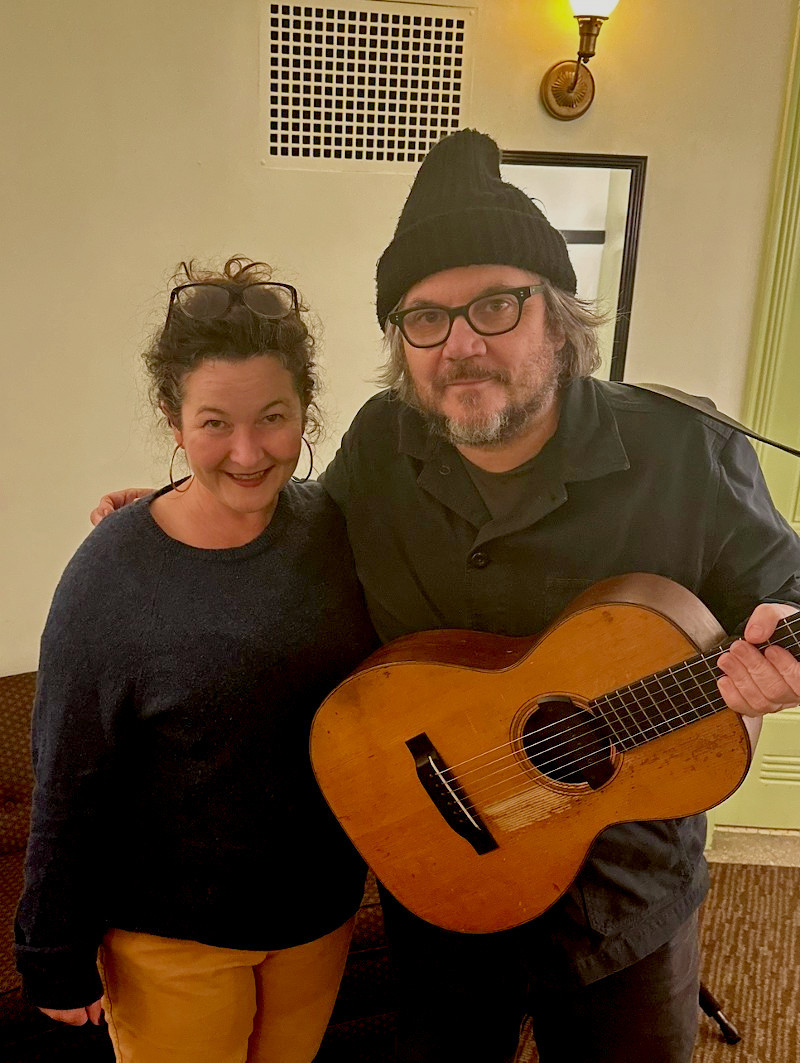The Amplify Project and Spin Inc. Bring Detroit Electronic Music Conference to Washtenaw Community College on March 2

After the Detroit Electronic Music Conference was put on hold last year due to a lack of venue, Rod Wallace and Ron “DJ Jungle” Johnson decided to bring the music production and DJ education event to Washtenaw County.
The heads of music nonprofits the Amplify Project and Spin Inc. will co-host the Detroit Electronic Music Conference (or “D Mack”) on March 2 at Washtenaw Community College’s Morris Lawrence Building.
“I first met DJ Jungle, who’s the executive director of Spin Inc., at a meeting with Grove [Studios], and they were looking for some opportunities to partner. Spin Inc. came and participated in our TAP IN event in 2023 and we talked about how we could collaborate,” said Wallace. about the free conference, which takes place March 2 and last occurred at the now-defunct Detroit Institute of Music Education in 2022.
“We had a conversation about his interest in bringing back the ‘D Mack,’ and I said, ‘Well, listen, we have a great partner in WCC … and [we can] tie it in with the arts management coursework that we’re teaching.’”
As part of D Mack’s preparations, the Amplify Project and Spin Inc. have enlisted WCC arts management students to help run the conference since their capstone class is built around event creation, collaboration, and execution.
Clear and Present: Darrin James looks at marriage, family, and loss on “See Right Through”

When it comes to writing about love and loss, Darrin James believes in being crystal clear.
The Ann Arbor singer-songwriter and producer shares honest and vulnerable stories about marriage, family, death, and uncertainty on his latest album, See Right Through.
“A lot of people say it’s heart-on-your-sleeve. I think that’s true and it’s always how I’ve kinda written. This album came from the more reflective side of things, and you have to embrace the vulnerability to write an honest song,” said James, who plays guitar, piano, organ, and synth on his fourth full-length release.
“Sometimes those tropes can express really true feelings … and sometimes when you’re being honest, a song is easier to write. It comes out more like a diary … and you’re staring at it thinking, ‘Now that it came out of me, that’s the song—it’s done.’”
On See Right Through, James reveals a gamut of emotions ranging from gratitude to joy to grief to hopelessness across seven tracks. Those raw feelings come to life through the album’s personal lyrics, heartfelt roots-rock instrumentation, and dreamy synth and horn textures.
“Those were personal songs that I waited until I had [them], and it made more sense after I had the love songs to counter the sad songs. I thought, ‘Now the whole album can have an arc of not just being a sad story,’” he said.
“Because [the songs] are more personal, they’re also more universal and timeless … Those themes I’m trying to deal with are ones that everyone [experiences].”
All the Time: Frontier Ruckus Explores the past, present, and future on new album

For Frontier Ruckus, aging represents a mixture of nostalgia, fear, and hope.
The Detroit-Ypsilanti folk-rock trio of Matthew Milia, David Jones, and Zachary Nichols explores those feelings alongside the passage of time on its new album, On the Northline.
“The main soundbite that Matt has been saying about the record is that half of the songs were written before he met his wife, Lauren,” said Nichols, who plays trumpet, musical saw, melodica, and air organ on the album.
“He said half of the songs are angsty and half of them are happy. I hear a lot in the lyrics about getting older, looking back, and thinking about the future. I think we all feel a little bit middle-aged now.”
As part of that reflection, Frontier Ruckus engages in deep soul-searching across On the Northline’s dozen tracks. Contemplative lyrics, vivid suburban imagery, and wistful Americana, country, and jazz-inspired instrumentation encourage listeners to ponder their life trajectories.
“The feelings and the ruminations on aging and getting to the point that we’re at in our lives … they’re probably a little conflicted because it’s conflicting for all of us,” said Jones, the band’s banjoist-vocalist. “To a certain extent in Matt’s songs, there’s always a lot of nostalgia in a way that’s positive, but sad as well.”
Despite those conflicting thoughts, Frontier Ruckus forges ahead and finds some solace while revisiting hometown landmarks, adapting to everyday surroundings, and welcoming unexpected changes.
“There’s a certain amount of happiness to be where we are now and be past the turbulent days of our youth when we were in the van all the time,” Jones said. “There’s a level of contentment with being in this place that we’ve all settled in that feels good and more comfortable.”
I recently spoke with Jones and Nichols about waiting seven years between releases, dissecting the album’s introspective themes and tracks, writing and recording the album, preparing for two celebratory shows, and going back out on the road.
Weatherproof: Annie and Rod Capps Celebrate Life’s Highs and Lows on “Love and Rain” Album

Annie and Rod Capps weather life’s sunny and stormy moments together on Love and Rain.
Those moments also serve as lighthearted and serious reminders about gratitude on the married duo’s latest album.
“There’s an overarching theme of love and rain being that contrast and balance of life,” said Annie Capps, the duo’s vocalist-guitarist, who’s based in Chelsea with her husband Rod Capps. “It’s about not taking the rough stuff too seriously, yet it’s also about being grateful for the good stuff and not taking things for granted.”
The Capps demonstrate that mindset personally and professionally on Love and Rain, which features 10 tracks filled with perceptive lyrics, vibrant Americana instrumentation, and rich harmonies.
“Annie is fortunate because she has an outlet to write songs about these things,” said Rod Capps, the duo’s guitarist-violinist-violist, who will celebrate 30 years of marriage to Annie Capps in June. “My role in the songwriting is to color around the edges. Annie builds these structures, and I help flesh them in and put filigree in.”
I recently spoke to the Capps about celebrating their anniversary, working with their bandmates, exploring different themes on the album, writing and recording tracks for Love and Rain, preparing for their annual Valentine’s Day show at The Ark, and planning for other performances and projects.
DIY Approach: Manchester Underground Music and Art Supports Local Artists Through Monthly Live Shows

Back in 1977, high school friends Steve Girbach and John Mooneyham bonded over listening to Rush, Judas Priest, and AC/DC albums after school.
Those listening sessions at Mooneyham’s house in Manchester eventually turned into serious discussions about forming a band and playing live shows.
It wasn’t until a few years after graduating from Manchester High School that Girbach and Mooneyham put their musical plan into action.
“Steve and I were talking and we said, ‘Why don’t we get some gear and we’ll put on shows and festivals?’ We had all these grand ideas people in their early 20s come up with,” said Mooneyham, who now co-runs the Manchester Underground Music and Art monthly concert series with Girbach.
“About a month later, Steve said, ‘I invited some guys over to your house to play some music and you’re gonna play bass.’”
Together, guitarist Girbach and bassist Mooneyham played in two cover bands, Allister and The DTs, and later hosted a music festival featuring 13 acts at a former amusement park in the Irish Hills.
Not long after that, The DTs called it quits and everyday life took over for Girbach and Mooneyham. What they didn’t realize at the time was that initial music festival helped lay the groundwork for what would become Manchester Underground Music and Art in 2019.
Sense of Adventure: Instrumental Duo Mindful Dynasty Experiments With Different Genres on “The Barn Waltz” Album

When it comes to creating music, Mindful Dynasty embraces a choose-your-own-adventure approach on The Barn Waltz.
The South Lyon instrumental duo of Jason Wiseley (guitar, percussion, strings) and Toshana Grim (bass, strings) experiments and improvises with several genres—ranging from psych rock to EDM to flamenco—on its latest double album.
“It’s like going through an adventure, and there are highs and lows; there are also fast parts and slow parts. There are parts that are a little funky and maybe ones that make you laugh a little because there’s a wonky note,” Grim said.
“There are also parts where you might think, ‘This is so beautiful.’ That’s just life—in my opinion—because it is an adventure. The more you can just relax and go with the flow, the more fun you have.”
That carefree attitude and creative mindset flow throughout The Barn Waltz’s 17 tracks, which also feature elements of metal, classical, and funk interspersed with film samples.
“I write for everybody, but in my mind’s eye, it’s [especially] for somebody who plays an instrument. … I just want people to feel inspired. I want people to [hear] our music and think, ‘Oh Jason’s goofy, I can do that, too,’” said Wiseley, who workshopped the album’s tracks live with Grim during a past residency at Zerbo’s Market & Bistro in Commerce Township.
“Part of the reason why The Barn Waltz is dark and has all the movie samples is because I wanted to juxtapose the pretentiousness of the guitar playing. I wanted to put in this silly stuff and put in all of the dance music to pull back the idea that to have that level of fun playing music requires you to actually not have any fun at all.”
I recently spoke with Wiseley and Grim about their backgrounds, the origin of Mindful Dynasty, the evolution of their sound, select tracks from The Barn Waltz, the creative process for the album, and upcoming plans.
Things to See: Pulp Art Exhibit Roundup for Winter

While it’s too cold to spend time outside this winter, there are plenty of places to stay warm indoors and peruse artwork from local creatives. We’ve compiled a comprehensive list of visual art exhibits and events around Washtenaw County to visit and enjoy this season.
720’ 10”
January 25 to April 12
North Campus Research Complex Galleries, Ann Arbor
Designer and sculptor Peter Dunn’s body of work is rooted in the shutdown of shops and studios during the pandemic and the inability to receive materials for large sculpture and furniture fabrication. At its core, much of his work studies the manipulation of simple geometry. Dunn looks at the form from different forced perspectives—exploding, augmenting, slicing, repeating, and lighting. An opening reception will take place January 25 from 4 pm-7 pm.
Stamps School of Art & Design Staff Exhibition
January 25 to April 12
North Campus Research Complex Galleries, Ann Arbor
This exhibit features artwork from U-M’s Penny Stamps School of Art & Design staffers Catherine Coveyou, Elizabeth Dizik, Veronica Falandino, Rita K. Lee, Matthew Pritchard, Joel Rakowski, Joe Rohrer, and Veronica Tabor. An opening reception will take place January 25 from 4 pm-7 pm.
Anything Goes: All Media Exhibition
January 26 to March 2
Gutman Gallery, Ann Arbor
The fourth annual all-media exhibition will highlight artists, styles, and techniques of all kinds and be juried by Ingrid Ankerson, an Ypsilanti printmaker, quilter, graphic designer, and instructor.
50 Years of Hip-Hop: Influential albums From Washtenaw County

Hip-hop started in the Bronx in 1973 and spread across the world to become one of the most popular and influential genres ever created.
There were numerous 50th-anniversary celebrations for the art form in 2023, and we're working on some articles about the history of hip-hop in Washtenaw County that we’ll be sharing soon.
But before that, we wanted to share some influential hip-hop records made by Washtenaw County artists—as identified through research and interviews with local creatives for our upcoming history pieces.
There were plenty of other important recordings that were cited, too, but we're highlighting these selections because they’re the only ones you can listen to online. (A broader list will accompany one of our upcoming articles.)
Read on and drop us a line at pulp@aadl.org if you want to share stories and memories about the Washtenaw County hip-hop community.
Feeling Stranded: Linen Ray Reclaim Their Sense of Hope on ‘By a Thread’ Single

Despite feeling overwhelmed and heartbroken, Linen Ray refused to give up hope.
The married folk-rock duo of Rebekah Craft (vocals) and Gabriel Craft (drums, backing vocals) tried to stay positive and calm while helping a loved one navigate a mental health crisis.
But over time, it felt like they were carrying the weight of the world on their shoulders. There were moments when caring for another became too much to handle alone.
“Trauma will sometimes cause a person to bury their pain and live in denial. For us, it felt so completely overwhelming,” said Rebekah Craft, who hails from Ypsilanti, but is based in Nashville, Tennessee with Gabriel Craft and their family.
“We weren’t exactly living in denial, but when life comes down on you so hard and you feel helpless, you sometimes lose the ability and energy to express your thoughts and feelings. We were grieving and in a dark place.”
In that dark place, Linen Ray reclaimed their sense of hope and channeled their emotions into songwriting. What resulted is “By a Thread,” a vulnerable new ballad that serves as a plea for help and understanding.
This Is Your Song: Jeff Tweedy's New Book Makes Us Think About How We Connect With Our Favorite Music

Back in 2009, I actually heard Wilco for the first time.
It’s not that I didn’t know the band’s music, but it was the first time I had developed an emotional connection to one of their songs.
It was “You and I,” a heartwarming duet with Feist from the band’s self-titled album. The track addresses two lovers trying to preserve a relationship as Wilco frontman Jeff Tweedy sings, “You and I, we might be strangers / However close we get sometimes / It’s like we never met.”
While I’ve never met Tweedy and or any of the other Wilco members, “You and I” emanates a comforting familiarity in terms of its memorable lyrics, bittersweet harmonies, and smooth bassline.
There’s an unexplainable pull I feel to it, and it’s something Tweedy easily masters after nearly three decades of writing Wilco songs.
“I’m much more fascinated by the blurry area between a song and the mind that receives it, puts it back together in a shape that fits their own life, and allows the heart to take ownership,” writes Tweedy in his latest book, World Within a Song: Music That Changed My Life and Life That Changed My Music.
That statement nicely encapsulates the key takeaway from Tweedy’s third book, which highlights the memorable connections—both positive and negative—he’s made with 50 different songs throughout his life.


































